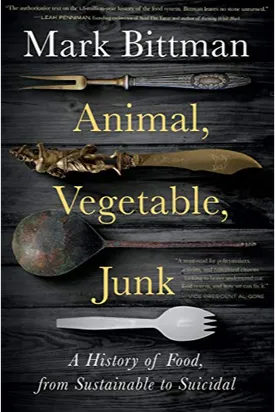Animal, Vegetable, Junk: A History of Food, from Sustainable to Suicidal by Mark Bittman
In Animal, Vegetable, Junk: A History of Food, from Sustainable to Suicidal, Mark Bittman explores the history of food by tracing its transformation over time, from sustainable to suicidal. He begins by looking at the past, examining traditional diets and how they were adapted for the modern world. He then looks at the current state of food production, focusing on the emissions caused by its current industrial system, and how the choices we make today are shaping the future of food. Finally, he offers potential solutions to these issues.
Bittman begins with a discussion of traditional diets, noting that they often featured simple combinations of plants, animals, and starches. He notes that many cultures have been living this way for centuries, and argues that traditional diets are still largely appropriate for today's world. He then examines some of the changes that have been made to traditional diets in order to accommodate the demands of a more industrial world. These changes, he points out, have caused the total global carbon footprint to double since the early part of the twentieth century.
To address this issue, Bittman next focuses on the current state of food production, scrutinizing the efficiency and sustainability of modern farming and food production practices. He looks at the pressures of industrial scale farming, noting that the widespread practice of monocultures and the use of excessive chemical inputs are unsustainable. He also tackles the impacts of processed food, emphasizing the role of sugar, salt, and fats in creating a feast of destructive health consequences.
Bittman then dives into the future of food, exploring the possibilities of sustainable food systems. He examines the potential for a simpler, more resilient food system—one based on nutritional seasonal eating, utilizing small-scale, diversified farming. He looks at the potential for cutting down food waste and encouraging consumers to value and purchase local, seasonal, and sustainably-produced food. He also looks at methods of preserving traditional cuisines and revisiting traditional diets as a foundation for modernizing our food systems.
In the final part of his book, Bittman puts forward potential solutions to the issues he has discussed. He suggests options such as community-supported agriculture, regulation of food producers, and government support of food research and development. He also provides tips for consumers, encouraging readers to reduce their meat consumption and supporting the purchase of locally-produced foods and organic farming practices. He also recommends reading labels carefully, seeking out sustainable sources for meat, dairy, and fish, and learning to cook for oneself, instead of relying on pre-prepared and heavily processed meals.
By drawing on history, current practices, and potential solutions, Animal, Vegetable, Junk: A History of Food, from Sustainable to Suicidal offers a comprehensive and compelling look at food systems and the challenges they face, as well as potential paths towards a more sustainable future. Bittman's analysis is thoughtful and clear, and he emphasizes the importance of individual actions, as well as of challenges to current policies and practices. Through this book, Mark Bittman shows us how, despite the current state of the global food system, we can each contribute to a more sustainable path for the future.

